|
|
|
Sort Order |
|
|
|
Items / Page
|
|
|
|
|
|
|
| Srl | Item |
| 1 |
ID:
130964
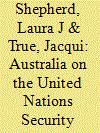

|
|
|
|
|
| Publication |
2014.
|
| Summary/Abstract |
Until 2015, Australia is uniquely positioned on the world stage to make a real difference to women's lives in conflict, transitional and post-conflict countries by ensuring they are actively represented in all peace negotiations1. The Australian government has secured not only a non-permanent seat on the United Nations Security Council (UNSC), but also a seat on the Executive Board of UN Women, the UN entity charged with enhancing gender equality and the empowerment of women. These represent two internationally significant avenues through which the Australian government can fulfil its promise to engage women in the governance of international peace and security, furthering the UN's Women, Peace and Security (WPS) agenda. This agenda, the primary architecture of which comprises seven interrelated UNSC Resolutions dating back to UNSC Resolution 1325 (2000), mandates that women should be represented at and actively participate in all peace negotiations, as well as making binding international commitments to eliminate violence against women and protect women's rights
|
|
|
|
|
|
|
|
|
|
|
|
|
|
|
|
| 2 |
ID:
126735
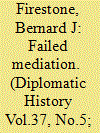

|
|
|
|
|
| Publication |
2013.
|
| Summary/Abstract |
U.N. Secretary General U. Thant (1961-1971), a vocal and persistent critic of the American war effort in Vietnam, attempted, with little success, to initiate negotiations to end the war. His efforts included public calls for negotiating formats that would include all the parties to the conflict, such as a reconvening of the Geneva Conference, and behind-the-scenes diplomacy to produce direct negotiations between the United States and North Vietnam. This article argues that Thant's failure to serve as a mediator had less to do with his own skills as a diplomat than they had to do with the Johnson administration's determination to achieve a military solution to the war. In this regard, the results of Thant's efforts were little different from those of other would-be mediators who also tried and failed to initiate negotiations.
|
|
|
|
|
|
|
|
|
|
|
|
|
|
|
|
| 3 |
ID:
126584
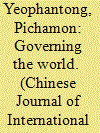

|
|
|
|
|
| Publication |
2013.
|
| Summary/Abstract |
This article examines, from an historical perspective, how the idea of the 'responsibility of power' speaks to Chinese political thought, and assesses its significance to China's evolving engagement with global governance today. It argues that a shift in China's global mentality is now underway: from an aversion to taking the lead to one which sees China reprising its role as a global power and shouldering the responsibilities attached to this status in the management of world affairs. But, contrary to conventional depictions of China's 'responsible power' identity as an externally imposed or purely modern construct, the article illustrates how notions of responsibility and the corollary concept of responsible governance are not new, but have deep roots in Chinese traditions of statecraft and corresponding visions of world order. Taking into account the complex interplay between Chinese conceptions of responsibility and expectations of its global role, change is necessarily situated amidst historical continuity, as linkages are drawn between China's past and its present.
|
|
|
|
|
|
|
|
|
|
|
|
|
|
|
|
| 4 |
ID:
124515
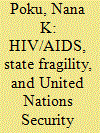

|
|
|
|
|
| Publication |
2013.
|
| Summary/Abstract |
When, in 2000, the United Nations Security Council (UNSC) discussed a global response to the growing HIV/AIDS pandemic, it was the first time in the institution's history that its members had debated a non-mandated issue. The preserve of this institution had, until then, been focused on preventing wars and the proliferation of weapons of mass destruction. Yet the mounting evidence on the societal impacts of HIV/AIDS was no less devastating for affected communities. In most heavily affected societies, the prevalence of HIV/AIDS doubled in less than ten years. But was the case that led to UNSC Resolution 1308 overstated? This article revisits the case that led to the Security Council meeting and argues that, far from being overstated, Resolution 1308 helped to avert a crisis of unimaginable proportions.
|
|
|
|
|
|
|
|
|
|
|
|
|
|
|
|
| 5 |
ID:
130484
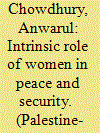

|
|
|
|
|
| Publication |
2014.
|
| Summary/Abstract |
International Women's Day in 2000 was an extraordinary day for me, and will remain so for the rest of my life. That day, I had the honor of issuing on behalf of the United Nations Security Council in my capacity as its president a statement that formally brought to global attention the unrecognized, underutilized and undervalued contribution women have been making towards the prevention of wars, peace-building and engaging individuals and societies to live in harmony. The members of the Security Council recognized that peace is inextricably linked with equality between women and men, and affirmed the equal access and full participation of women in power structures and their full involvement in all efforts for peace and security.
|
|
|
|
|
|
|
|
|
|
|
|
|
|
|
|
| 6 |
ID:
130488


|
|
|
|
|
| Publication |
2014.
|
| Summary/Abstract |
For advocates of United Nations Security Council Resolution 1325 on women, peace and security, the 10th anniversary of the resolution in October 2010 2011was no longer an occasion to sing praises to the resolution. We all know that UNSCR 1325 is important. We all know that it is groundbreaking and game-changing. We have heard all of that from the UN, from member states and even from our fellow civil society actors year in and year out in the last 10 years.
What many of us have decided to do was to take stock of where the world is in terms of the actual implementation of the resolution and the push for real commitments and concrete actions - commitments that would not be long on promise but short on implementation. So where are we in terms of actual implementation 10 years on? Members and partners of the Global Network of Women Peacebuilders (GNWP) conducted in-country monitoring of UNSCR 1325's implementation in Afghanistan, Burundi, Canada, the Democratic Republic of Congo, Fiji, Nepal, the Netherlands, the Philippines, Rwanda, Sierra Leone and Uganda, using a set of common indicators they selected and developed.
|
|
|
|
|
|
|
|
|
|
|
|
|
|
|
|
| 7 |
ID:
126884
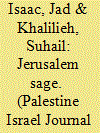

|
|
|
|
|
| Publication |
2011.
|
| Summary/Abstract |
In November 1947, the United Nations General Assembly adopted resolution 181, calling for the partition of Mandatory Palestine into two independent states - one for the Palestinian Arabs and one for the Jews - and for the designation of Jerusalem and its traditional link with Bethlehem as corpus separatum: a separate entity under special international protection to be administrated by an international body.
|
|
|
|
|
|
|
|
|
|
|
|
|
|
|
|
| 8 |
ID:
130701
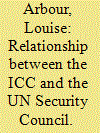

|
|
|
|
|
| Publication |
2014.
|
| Summary/Abstract |
THE POWER OF THE UNITED NATIONS SECURITY COUNCIL TO REFER COUNTRY situations to the International Criminal Court (ICC) has been hailed, particularly among international human rights activists, as a chance to expand the reach of international criminal justice by offering the opportunity to hold accountable perpetrators of atrocities who might otherwise be exempt from prosecution and punishment. The historic referral of the situation in Darfur in March 2003 was widely welcomed as an important step in the fight against impunity as was the Security Council's later, and more controversial, referral of Libya in February 2011. In principle the expansion of the reach of accountability is something to be welcomed, but it is important to recognize the costs of this expansion as well as the danger that they may outweigh the intended benefits.
|
|
|
|
|
|
|
|
|
|
|
|
|
|
|
|
| 9 |
ID:
133740
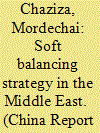

|
|
|
|
|
| Publication |
2014.
|
| Summary/Abstract |
Since the event popularly termed the 'Arab spring' and the changing balance of power in the Middle East, where China has economic interests, there has been a conspicuous balancing behaviour against the United States, the sole superpower. This article discusses whether the Chinese and Russian vetoes on Syria can be interpreted as a potential threat to counterbalance American moves in world politics, particularly in the Middle East. After abstaining on the no-fly zone over Libya, China vetoed thrice on the Syrian crisis. Beijing used its position to frame the agenda of the Security Council and to indirectly challenge US objectives in the region. China's diplomatic cooperation and coordination with Russia displays their mutual determination to check the US' moves in United Nations Security Council (UNSC) debates on the Syrian crisis. Yet, China is still very cautious about confronting the US directly or antagonising it, realising that it is still much weaker than Washington, and would gain nothing from such actions. Therefore, the Chinese strategy is to not engage in hard balancing behaviour, but in soft balancing which allows for the creation of strategic relationships through which hard balancing can occur in the future.
|
|
|
|
|
|
|
|
|
|
|
|
|
|
|
|
| 10 |
ID:
125358
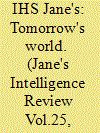

|
|
|
|
|
| Publication |
2013.
|
| Summary/Abstract |
Discussions are ongoing about what form UN security council reform should be take, although such talks are characterized by a lack of consensus. HIS Jane's examines the various proposals and the implications of any of these being implemented
|
|
|
|
|
|
|
|
|
|
|
|
|
|
|
|
| 11 |
ID:
133958
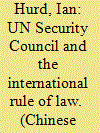

|
|
|
|
|
| Publication |
2014.
|
| Summary/Abstract |
This article considers the relationship between international law and the UN Security Council. The practical power of the Council is constituted at the intersection of its legal framing, its political legitimacy, and the interests of powerful states. This sometimes means the Council has less power than is assigned to it by the UN Charter, but it often means that it has more. It is clear that the Council sits within the international legal system, the legal limits on its action are interpreted in light of prior Council practice, and thus the meaning of 'compliance' and 'violation' of the Charter changes over time. Some transgressions of the Charter are understood as informal amendments to it; others are seen as threats to international peace and security that impel enforcement action. This ambiguity in the law and practice of the United Nations is inherent in the idea of the 'international rule of law'. The Council straddles the unstable boundary between international law and politics, both undermining and reinforcing the distinction between them.
|
|
|
|
|
|
|
|
|
|
|
|
|
|
|
|
| 12 |
ID:
133531
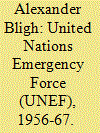

|
|
|
|
|
| Publication |
2014.
|
| Summary/Abstract |
With the conclusion of almost every round of hostilities between Israel and one of its neighbours the idea of international forces is being raised once again. This is basically an improved and revised initiative for stationing international forces to supervise (and perhaps impose) a ceasefire between the parties. In the Arab-Israeli framework, it is in essence the old approach which has been in service since 1948. Only one force, UNEF, stands out as not having been approved by the Security Council and clearly failing its intended but vaguely defined mission. The current analysis leads to the conclusion that in this particular regional conflict, the positioning of international forces must always come within the context of a more comprehensive settlement. That way, by violating a force's mandate, each party would lose either land or diplomatic recognition. Moreover, if a Middle Eastern peacekeeping operation is to take place in the future, it has to include organic units of the warring parties, encouraging peaceful interactions. Such units should reinforce organic units from countries acceptable to all parties. Hopefully, future missions, taking into consideration some of the approaches suggested here, can continue to contribute to regional processes for peace.
|
|
|
|
|
|
|
|
|
|
|
|
|
|
|
|
| 13 |
ID:
126684
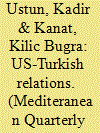

|
|
|
|
|
| Publication |
2013.
|
| Summary/Abstract |
US-Turkish relations are in the best shape of recent memory. President Barack Obama's first official overseas visit (in 2009) was meant to start a new type of relationship with Turkey, dubbed the "model partnership," but the bilateral relations received particular attention in the wake of two major diplomatic crises in 2010: a flotilla incident-when the ship the Mavi Marmara, owned by a Turkish nonprofit organization, was boarded by the Israeli military while on the way to Gaza with aid-and Turkey's "no" vote at the UN Security Council on sanctions against Iran. Both of these crises had to do with regional issues of vital importance for both the United States and Turkey. The Arab Spring that began in late 2010, however, created a new dynamic that rendered cooperation between the two countries critical.
|
|
|
|
|
|
|
|
|
|
|
|
|
|
|
|
| 14 |
ID:
133936
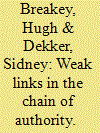

|
|
|
|
|
| Publication |
2014.
|
| Summary/Abstract |
The United Nations Security Council mandates peacekeeping operations to protect civilians, and regularly authorizes operations to use force to achieve this objective. Yet in the challenging situations facing contemporary peacekeeping operations, local civilians remain vulnerable to extreme violence. One set of reasons for this unwelcome result surrounds the decisions to protect civilians forcefully in any given context. This paper describes how peacekeeping operations vest discretion over the use of robust force across multiple agents. Using signal detection theory to model the decision-making of these agents, our analysis shows how the iterative nature of the decision-making process gives rise to a chain of authority where the most conservative decision-maker tends to prove decisive. With this analysis in tow, we turn our attention to recent protection initiatives, including Security Council Resolution 2098 (2013) and its controversial mandate for the new 'Intervention Brigade' in the Democratic Republic of the Congo.
|
|
|
|
|
|
|
|
|
|
|
|
|
|
|
|
|
|
|
|
|